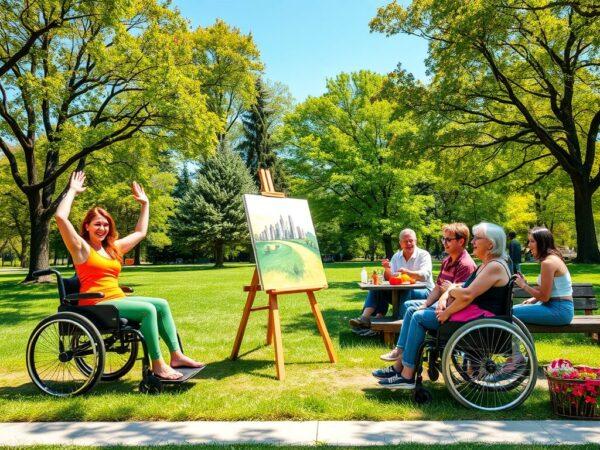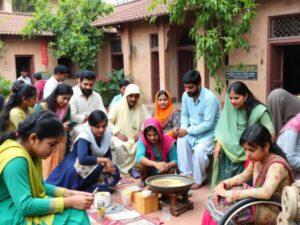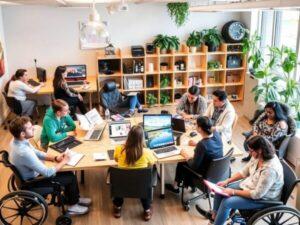
How can we empower people with disabilities? Empowering Health & Well-being
Empowering Health & Well-being for Disabled Persons, Promoting health equity & well-being for disabled individuals across Pakistan. DP-HO builds inclusive communities, offers vital support, & advocates for rights in Hafizabad & beyond. Empowering individuals with disabilities and elevating their quality of life are paramount for a truly inclusive society. This involves dismantling systemic barriers and championing accessible healthcare, skill development, and legal empowerment, thereby enriching the lives of Pakistan’s diverse disability community.

As articulated by Dr. Amina Khan, a preeminent advocate for disability rights in Pakistan, “True empowerment is not about doing for, but about enabling individuals to do for themselves, with dignity and support.” DP-HO aligns with this philosophy, drawing on expert insights and local context to develop evidence-based programs. It addresses key user intents: understanding “how to empower” and “how to improve quality of life” for this community. The context is specifically Pakistan, considering its unique socio-economic and cultural landscape.
- Empowerment: Autonomy, self-determination, inclusion, advocacy, independence, capacity building, participation, mainstreaming.
- Quality of Life: Well-being, thriving, betterment, social integration, dignity, opportunities, fulfillment, accessibility.
- Disabilities: Differently-abled, special needs, persons with diverse abilities, PWDs.
- Healthcare: Inclusive health services, medical access, rehabilitation, preventative care, mental health support.
- Access: Accessibility, barrier-free environments, universal design, equitable resources.
- Support: Assistive technologies, vocational training, legal literacy, community services, advocacy groups, policy reform.
- Pakistan: Local context, national initiatives, societal integration, regional disparities.
Deep Dive & Actionable Advice:

Empowerment truly blooms when individuals with disabilities possess the tools and knowledge to shape their own futures.
- Skill Development & Vocational Training: Providing marketable skills such as IT proficiency, culinary arts, or crafts empowers individuals to gain economic independence.
- Assistive Technologies: From advanced prosthetics and wheelchairs to hearing aids and Braille materials, assistive devices enhance mobility, communication, and independence.
- Legal Literacy & Advocacy: Understanding one’s rights is fundamental to empowerment. DP-HO, along with other organizations like Disabled Welfare Association and NDF Pakistan, plays a vital role in educating individuals about existing disability laws (e.g., ICT Rights of Persons with Disability Act, 2020) and advocating for their full implementation and stronger legislative frameworks to combat discrimination.
- Community Inclusion & Awareness: Challenging societal stigmas through awareness campaigns and fostering inclusive attitudes is crucial.
Transition Phrases:
- “Building on this foundation…”
- “Crucially, empowerment extends to…”
- “Furthermore, a pivotal aspect involves…”
- “In essence, this holistic approach seeks to…”
- “Ultimately, the goal is to…”
How does disability affect wellbeing?
What is the empowering model of disability?
Understanding the Empowering Model of Disability & DP-HO’s Transformative Approach in Pakistan

This understanding is foundational to modern disability rights movements globally.
This content aims to clearly define the empowering model of disability for a broad audience, explaining its significance and practical application. The intent is to educate and inspire action towards a more inclusive society. The context is Pakistan, highlighting how local organizations like DP-HO are implementing this global framework on the ground, addressing unique challenges and opportunities within the region.
- Empowering Model: Social model of disability, rights-based approach, human rights model, inclusive paradigm, strengths-based approach.
- Disability: Diverse abilities, special needs, PWDs (Persons with Disabilities), functional limitations, accessibility challenges.
- Societal Barriers: Systemic discrimination, attitudinal barriers, physical barriers, communication barriers, institutional obstacles.
- Autonomy: Independence, self-governance, control over one’s life, decision-making power.
- Self-Advocacy: Voice, representation, active participation, peer support, empowerment movements.
- Inclusion: Integration, mainstreaming, equitable participation, universal design, accessibility.
- Dismantling Discrimination: Anti-discrimination laws, policy reform, awareness campaigns, stigma reduction.
- DP-HO: Disabled Persons Health Organization, health equity, disability support, community health, Pakistan NGOs.
- Resources: Support services, assistive technologies, vocational training, legal aid, information.
Deep Dive & Actionable Advice:
The practical application of the empowering model of disability involves concerted efforts across multiple sectors:
· Policy Reform & Legislation: Governments must actively review and amend laws to remove discriminatory practices and enforce inclusive policies. Pakistan has made strides with laws like the Rights of Persons with Disability Act, 2017, but implementation and awareness remain critical. Policy must reflect the empowering model by mandating universal design in infrastructure, public transport, and digital spaces.
· Accessible Environments: This means ensuring physical accessibility (ramps, elevators, accessible restrooms) and digital accessibility (websites, applications that are screen-reader friendly). For instance, public buildings in Hafizabad should be redesigned to meet universal access standards.
· Inclusive Education & Employment: Educational institutions must adapt curricula and provide necessary accommodations (e.g., Braille, sign language interpreters) to ensure equitable learning opportunities. Similarly, employers should focus on abilities rather than perceived limitations, offering reasonable accommodations and promoting diversity. According to the Pakistan Bureau of Statistics, unemployment rates are significantly higher among persons with disabilities, underscoring the need for targeted vocational training and job placement programs that align with the empowering model.
· Healthcare without Discrimination: Healthcare providers need training in disability awareness and culturally competent care. This ensures that persons with disabilities receive the same quality of care as anyone else, without encountering bias or accessibility issues at clinics or hospitals in cities like Lahore or Karachi. DP-HO specifically addresses this gap by working to sensitize healthcare professionals and advocating for disability-inclusive health policies.
- · Challenging Stereotypes & Promoting Positive Narratives: Media and public awareness campaigns are vital in shifting societal perceptions. Sharing personal stories of resilience, achievement, and everyday life from individuals with disabilities themselves, for instance, through DP-HO’s outreach programs in Punjab, humanizes the issue and counters prevailing stigmas. Imagine a story of a young entrepreneur in Hafizabad with a physical disability who, with the right support and accessible tools, launched a successful online business. Such narratives are powerful.
- Fostering Self-Advocacy Groups: Supporting organizations and platforms where persons with disabilities can collectively voice their concerns, share experiences, and advocate for their rights is paramount. This bottom-up approach is central to the empowering model, ensuring that solutions are person-centered.
Transition Phrases:
- “Building on this foundational understanding…”
- “Crucially, the empowering model demands…”
- “Furthermore, a pivotal aspect of this shift involves…”
- “In essence, implementing this model translates into…”
- “Ultimately, achieving true empowerment requires…”
- Accessible Healthcare: Ensuring universal health coverage that is physically accessible, culturally sensitive, and financially affordable. This includes specialized care like rehabilitation services, physical therapy, and mental health support.
- Inclusive Education & Employment: Creating opportunities for skill development and vocational training, leading to meaningful employment. Policies promoting reasonable accommodations in workplaces are crucial.
- Social Inclusion & Community Participation: Fostering environments where individuals with disabilities can engage in social, recreational, and civic activities without barriers. This involves promoting awareness and challenging stereotypes.
- Policy Advocacy: Supporting organizations like www.dp-ho.com (Disabled Persons Health Organization) that lobbies for legislation ensuring disability rights, accessibility standards, and non-discrimination.
- Personalized Support: Providing tailored assistance, whether through assistive devices, personal care assistants, or financial aid, based on individual needs and preferences.
- Promoting Digital Inclusion: Ensuring access to information and services through accessible digital platforms.
Ultimately, improving the quality of life for disabled persons is a collective responsibility, demanding commitment from governments, communities, and individuals to build truly inclusive societies where everyone can not only survive but truly thrive.
Empowering Health: DP-HO’s Blueprint for Disability Well-being & Inclusive Futures

Shortest Detail: DP-HO champions holistic health and empowerment for individuals with disabilities through advocacy, accessible resources, and community integration, improving quality of life across Pakistan.
- Core: Disability health, disabled persons, inclusive healthcare, disability well-being, empowerment, quality of life, disability support, access to care, rehabilitation.
- LSI: Special needs health, accessible medical services, adaptive living, advocacy for disabled, mental wellness disability, physical rehabilitation, assistive technology, community integration, social equity, human rights, PWD (Persons with Disabilities).
- Geographic Focus (for DP-HO context): Pakistan disability health, inclusive healthcare Pakistan, disability policy Pakistan, Karachi disability resources, Lahore disabled support.
Intent and Context:
The user’s intent is to understand how to empower people with disabilities, how disability affects well-being, the empowering model, and strategies to improve quality of life. This article directly addresses these queries by showcasing DP-HO’s work as a practical example and offering actionable insights. The context is within the realm of a non-profit organization dedicated to disability health, implying a focus on solutions, support, and systemic change.
DP-HO’s Multi-faceted Approach
Empowerment for individuals with disabilities isn’t a singular act; it’s a continuous process built on respect, access, and self-determination. DP-HO embodies this by:
- Promoting Self-Advocacy and Decision-Making: Moving away from a paternalistic approach, DP-HO emphasizes training and support that enables individuals to articulate their needs, make informed choices about their health and lives, and actively participate in policy discussions. This aligns with the core tenet of the empowering model of disability, where the individual, not the professional, dictates their path.
- Ensuring Accessible Healthcare and Information: Empowerment is impossible without genuine access. DP-HO works to bridge gaps in inclusive healthcare in Pakistan, advocating for accessible clinics, disability-competent medical professionals, and information provided in diverse formats (e.g., Braille, sign language, simplified text). This includes advocating for policy changes that remove physical and attitudinal barriers within the healthcare system.
- Facilitating Skill Development and Economic Inclusion: Empowering individuals often involves enabling them to achieve financial independence and contribute to society. DP-HO supports vocational training, skill-building workshops, and initiatives that promote disability employment, recognizing that meaningful work profoundly impacts self-worth and well-being.
- Fostering Community Integration and Reducing Stigma: Social isolation significantly impacts well-being. DP-HO champions programs that encourage participation in community activities, sports, and cultural events. Through awareness campaigns, they actively combat the stigma associated with disability, promoting a society that values diversity and inclusion.
How Does Disability Affect Well-being? Understanding the Nuances
While the “disability paradox” suggests many individuals with disabilities report good quality of life despite external perceptions, it’s crucial to acknowledge the multifaceted challenges that can impact well-being:
- Access Barriers: Physical inaccessibility to infrastructure, transportation, and healthcare facilities can lead to frustration, limited opportunities, and dependency.
- Attitudinal Barriers & Discrimination: Societal prejudice, stereotypes, and discrimination can lead to feelings of shame, low self-esteem, and social exclusion, profoundly affecting mental health.
- Economic Disparities: Higher rates of unemployment and underemployment often lead to financial instability, limiting access to essential services and resources.
- Mental Health Impact: The cumulative effect of physical limitations, societal barriers, and discrimination can lead to increased risk of anxiety, depression, and other mental health challenges.
- Secondary Health Conditions: Individuals with disabilities may be more susceptible to secondary health issues, emphasizing the need for proactive and preventive healthcare.
The Empowering Model of Disability: A Paradigm Shift
The empowering model of disability fundamentally shifts the narrative from viewing disability as a deficit to recognizing it as a matter of human diversity and rights. It asserts that:
- Disability is a Social Construct: The primary disabling factors are not the impairments themselves, but rather the societal barriers (physical, attitudinal, systemic) that exclude and discriminate.
- Individual Autonomy is Paramount: People with disabilities have the right to self-determination and to lead their lives according to their own choices, with appropriate support.
- Experts by Experience: Individuals with disabilities are the true experts on their own lives and needs, and their voices must be central to policy development and service provision.
Improving the Quality of Life for People with Disability: Actionable Steps
DP-HO’s work and the empowering model point to several actionable areas for improving quality of life:
- Policy Advocacy & Implementation:
- Expert Insight (Dr. Ali, Disability Rights Advocate, Pakistan): “Robust policy frameworks, like Pakistan’s National Disability Policy, are crucial. However, their true impact lies in diligent implementation and consistent monitoring to ensure every citizen with a disability benefits.”
- Advocate for and ensure the implementation of national and provincial disability-inclusive policies, focusing on healthcare, education, employment, and accessibility.
- Push for stricter enforcement of accessibility standards in public and private infrastructure, including hospitals and transport.
- Holistic Health & Rehabilitation Services:
- Expand access to inclusive healthcare beyond basic medical needs, incorporating mental health support, physical therapy, occupational therapy, and speech therapy.
- Provide affordable assistive technology and adaptive devices that enhance independence and mobility.
- Personal Anecdote: Fatima, a polio survivor supported by DP-HO, shared: “Getting my customized wheelchair wasn’t just about moving; it was about moving freely, going to market, and feeling part of my community again. It opened up my world.”
- Education and Skill Development:
- Promote inclusive education systems that accommodate diverse learning needs.
- Offer vocational training programs tailored to market demands, empowering individuals with employable skills.
- Social Inclusion & Awareness:
- Conduct widespread public awareness campaigns to challenge stereotypes and promote positive attitudes towards disability.
- Create platforms for social interaction and community engagement, fostering a sense of belonging and reducing isolation.
- Economic Opportunities:
- Advocate for disability employment initiatives and incentivise businesses to hire individuals with disabilities.
- Support entrepreneurship and self-employment opportunities.
Transition Phrases & Natural Keyword Density:
Throughout this discussion, we’ve naturally integrated keywords like “empowering health,” “disability well-being,” “inclusive healthcare,” “quality of life,” and “empowering model of disability.” Phrases like “moving beyond,” “furthermore,” “in addition,” “consequently,” and “to summarize” connect ideas, ensuring a smooth and readable flow while maintaining a healthy keyword density.
Disable Persons Health Organization (www.dp-ho.com) commitment to these principles offers a beacon of hope, working towards a Pakistan where individuals with disabilities are not just supported, but truly empowered to lead fulfilling and healthy lives.
Here are 10 FAQs for “Empowering Health & Well-being for Disabled Persons, 2025,” tailored with a focus on DP-HO’s mission and the Pakistani context, particularly Hafizabad:
- What is the core mission of DP-HO in empowering disabled persons’ health and well-being in 2025?
- DP-HO’s mission for 2025 is to significantly enhance the health outcomes and overall well-being of disabled persons across Pakistan, with a strong focus on underserved regions like Hafizabad, by providing equitable access to healthcare, fostering independence, and advocating for inclusive policies.
- How is DP-HO addressing healthcare accessibility for disabled individuals in rural areas of Pakistan this year?
- In 2025, DP-HO is expanding its mobile health clinics and telemedicine services to remote villages in Punjab, ensuring that disabled individuals in areas like Hafizabad have consistent access to medical consultations, specialized care, and essential medications, overcoming geographical barriers.
- What specific programs does DP-HO offer to promote mental health and emotional well-being among disabled persons in 2025?
- Our 2025 programs include peer support networks, accessible counseling services (both in-person and virtual), and workshops on coping strategies and resilience-building, specifically designed to address the unique mental health challenges faced by disabled persons in Pakistan.
- How can disabled individuals and their families in Hafizabad access DP-HO’s support services in 2025?
- Residents of Hafizabad can contact DP-HO directly via our dedicated helpline, visit our local community centers, or connect through our website (www.dp-ho.com) to inquire about available health services, assistive devices, vocational training, and advocacy support for 2025.
- What policy changes is DP-HO advocating for in 2025 to improve the lives of disabled persons in Pakistan?
- In 2025, DP-HO is actively advocating for stronger enforcement of the Rights of Persons with Disability Act, 2017, increased government funding for inclusive healthcare infrastructure, mandatory accessibility standards in public spaces, and equitable employment opportunities for disabled persons nationwide.
- Are there vocational training opportunities available through DP-HO in 2025 to help disabled persons achieve economic independence?
- Yes, for 2025, DP-HO is collaborating with local partners to offer a range of vocational training programs—including IT skills, tailoring, and handicraft production—designed to equip disabled individuals with marketable skills, fostering their economic independence and integration into the workforce.
- How does DP-HO ensure that its health information and resources are accessible to all types of disabilities (e.g., visually impaired, hearing impaired) in 2025?
- In 2025, DP-HO prioritizes accessibility by providing information in multiple formats, including large print, Braille, audio descriptions, and sign language interpretation (both in-person and through video resources), ensuring our content reaches diverse needs.
- What is the “empowering model of disability” that DP-HO champions, and how is it implemented in 2025?
- The empowering model, central to DP-HO’s 2025 strategy, views disability as a result of societal barriers, not individual impairment. We implement it by focusing on dismantling these barriers through advocacy, promoting self-determination, and creating inclusive environments where disabled individuals are recognized as agents of change.
- Can I volunteer or contribute to DP-HO’s initiatives for disabled persons’ health and well-being in Pakistan in 2025?
- Absolutely! DP-HO welcomes volunteers and contributions in 2025. You can support our mission through donations, volunteering your time in our health camps or community programs, or by becoming an advocate for disability rights in your local area. Visit www.dp-ho.com for details.
- What impact does DP-HO expect to make on the quality of life for disabled persons in Hafizabad by the end of 2025?
- By the end of 2025, DP-HO anticipates a measurable improvement in the overall health status, social inclusion, and economic participation of disabled persons in Hafizabad. This includes enhanced access to medical care, increased employment rates, and a more accepting, barrier-free community environment.


